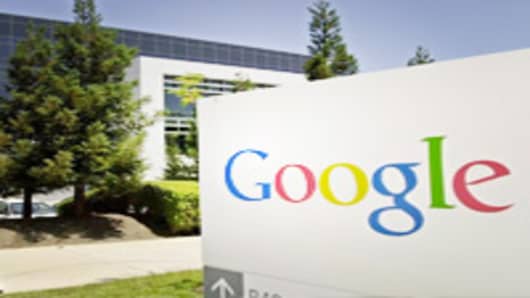When: Wednesday, April 30th at 4PM ET
Where: CNBC's "Closing Bell with Maria Bartiromo"
Following is the unofficial transcript of a CNBC EXCLUSIVE interview with Google CEO Eric Schmidt. During the interview with CNBC's Maria Bartiromo, Dr. Schmidt discusses Google's growth and U.S. slowdown, the possibility of a Microsoft acquisition of Yahoo!, online advertising growth rates, Google's European stronghold and Google's stock, among other topics.
All references must be sourced to CNBC's "Closing Bell with Maria Bartiromo."
Interview: Dr. Eric Schmidt of Google
MARIA BARTIROMO, host: Eric, thanks so much for joining us.
Dr. ERIC SCHMIDT: Thank you for having me on again.
BARTIROMO: Let's begin with this debate that seems to be brewing on Wall Street about growth. So the company grew 46 percent in the third quarter, 40 percent in the fourth quarter, 30 percent in the next quarter, and then sequentially 1 1/2 percent when you look quarter to quarter. How insulated would you say is Google to the economic slowdown or recession?
Dr. SCHMIDT: Well, the numbers you're using are year over year, quarter over quarter in the US. Globally, of course, we had good growth, and the US numbers are masked by the fact that, a year ago, we had a very strong quarterly growth of that quarter. So the real growth rate in the US is good, although overall growth rates are slowing, as they have for years. Just because of the scale and size of what we operate. The business has continued to be good.
BARTIROMO: OK, because when you get to a certain size, it's really hard to sort of grind down more market share when you've already got 70 percent or get that much bigger, given the fact that the company is getting--you're a large business.
Dr. SCHMIDT: But we have--we have multiple ways in which we grow. Of course, more people use the Internet, more people are using electronic commerce on the Internet, more people are clicking on the ads, and also our ad technology is getting much, much better. And it's really any one of those will push us over the top in any given quarter; sometimes they all come together. We don't seem to be very sensitive to macroeconomics, at least right now. We don't seem to be very sensitive to things like recession. But we're very sensitive to how quickly do we bring in the new product improvement or something like that.
BARTIROMO: The comScore data took everybody's estimates down, and this whole debate about whether it was accurate or not. How can you ensure that the growth occurs, even if people pull in their spending, if perhaps advertisers slow down on the budgets? I mean, is it fair to say that the hypergrowth of 2004 to '07 is--has been seen?
Dr. SCHMIDT: Well, as I said, if you think about it over a five- or six- or seven-year period, growth rates are slowing, as they have to. So I don't think it's a big shift. It's not, you know, today it was one way and tomorrow it's another. In our case, we focus on quality, and we have a very simple model. If we show fewer ads that are more targeted, those ads are worth more. So we're in this strange situation where we show a smaller number of ads and we make more money because we show better ads. And that's the secret of Google.


